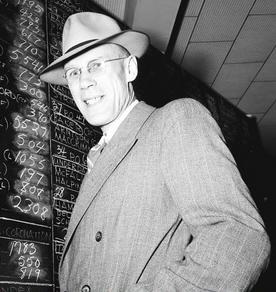Related Research Articles
There have been various groups in Canada that have nominated candidates under the label Labour Party or Independent Labour Party, or other variations from the 1870s until the 1960s. These were usually local or provincial groups using the Labour Party or Independent Labour Party name, backed by local labour councils made up of many union locals in a particular city, or individual trade unions. There was an attempt to create a national Canadian Labour Party in the late 1910s and in the 1920s, but these were only partly successful.
Unity, United Progressive Movement and United Reform were the names used in Canada by a popular front party initiated by the Communist Party of Canada in the late 1930s.

The 1945 Canadian federal election was held on June 11, 1945, to elect members of the House of Commons of the 20th Parliament of Canada. Prime Minister William Lyon Mackenzie King's Liberal government was re-elected to its third consecutive term, although this time with a minority government as the Liberals fell five seats short of a majority.
The Liberal-Labour banner has been used several times by candidates in Canadian elections:
Seymour James Farmer was a politician in Manitoba, Canada. He served as Winnipeg MLA from 1922 to 1949. During this time he also served as mayor of Winnipeg 1923-1924 and later as city councillor in the late 1920s and in the 1930s. He was the leader of the Manitoba Co-operative Commonwealth Federation from 1935 to 1947. He served as a cabinet minister in Manitoba's World War I coalition government.
Edwin Arnold Hansford was a politician in Manitoba, Canada, and served as leader of that province's Co-operative Commonwealth Federation between 1948 and 1952.
William "Scottie" Bryce was a politician in Manitoba, Canada. He briefly served as leader of the Manitoba Co-operative Commonwealth Federation (CCF), although he never served in the Legislative Assembly of Manitoba.
Lloyd Cleworth Stinson was a politician in Manitoba, Canada, and the leader of that province's Co-operative Commonwealth Federation (CCF) from 1953 to 1959. Although widely regarded as a capable leader, he was unable to achieve a major electoral breakthrough for his party.
John McDowell was a British-born Canadian merchant and politician in Manitoba. He served in the Legislative Assembly of Manitoba as a Progressive Conservative from 1945 to 1958.

Elmer Ernest Roper was a Canadian businessman, trade unionist and politician. He was a Alberta Co-operative Commonwealth Federation member of the Legislative Assembly of Alberta, 1942-1955, and mayor of Edmonton 1959-1963.
Harry Dean Ainlay was a Canadian educator and politician, noted for his many years of service in Edmonton, Alberta, as a teacher and principal with Edmonton Public Schools and as a long time member of Edmonton City Council, including three consecutive terms as Mayor of Edmonton.
Thomas Hubert Uphill was a socialist politician in British Columbia, longtime mayor of the town of Fernie and also represented the riding named for the town in the British Columbia Legislative Assembly for forty years, most of them as the legislature's sole labour MLA.
The 1945 Manitoba general election was held on October 15, 1945 to elect Members of the Legislative Assembly of the Province of Manitoba, Canada. The election was a landslide majority government for the incumbent coalition government led by the Liberal-Progressive Party.
Beresford (Berry) Richards was a politician in Manitoba, Canada. He served in the Legislative Assembly of Manitoba from 1943 to 1949. Elected as a candidate of the Cooperative Commonwealth Federation, he was twice expelled from that party during his tenure in the legislature.
Herbert Wilfred (Bert) Herridge was a Canadian politician and Member of Parliament.
Atlin was a provincial electoral district in the Canadian province of British Columbia. It made its first appearance on the hustings in the 10th provincial general election in 1903 and last appeared in the 34th provincial general election in 1986, after which it was merged with the Skeena riding and was succeeded by Bulkley Valley-Stikine.
Arthur Henry Williams was a Canadian trade union organizer and politician who served in both the Ontario legislature and the House of Commons of Canada on behalf of the Co-operative Commonwealth Federation. He was born in Tredegar, Wales, emigrating with his wife to Canada in 1929.
Dorothy Gretchen Steeves was a Dutch-born political figure in British Columbia. She represented North Vancouver in the Legislative Assembly of British Columbia from 1934 to 1945 as a Co-operative Commonwealth Federation member.
Wallis Walter Lefeaux was an English-born merchant, lawyer and political figure in British Columbia. He represented Vancouver Centre in the Legislative Assembly of British Columbia from 1941 to 1945 as a Co-operative Commonwealth Federation (CCF) member.
Joseph Hardcastle-Cumberland Corsbie was an accountant and political figure in British Columbia. He represented Peace River in the Legislative Assembly of British Columbia from 1945 to 1949 as a Co-operative Commonwealth Federation (CCF) member.